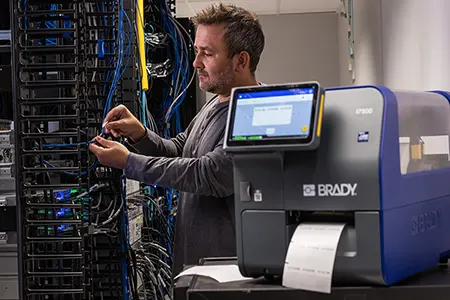
Brady Corporation unveils the i7500, a 76mm core label printer with auto-calibration, reducing waste and setup time to 40 seconds. (Image source: Brady Corporation)
No calibration, no formatting, no ribbon fumbling, no trial & error, no waste - the new i7500 redefines the 76mm core premium printing experience in electronics, electrical, manufacturing and laboratory industries.
Fed up with old-school high-volume label printing? The new BradyPrinter i7500 reimagines 76mm core high precision label printing.
The identification specialist Brady Corporation’s new BradyPrinter i7500 for 76mm core label rolls automatically adjusts all of its settings when new consumables are loaded. Ready to print in just 40 seconds, the printer also removes all calibration waste by printing the first label right.
Set up, don’t touch?
The approach in most industries to high volume, high precision thermal heat transfer 76mm core (3’’ core) label printing to date has almost always been “set it up and don’t touch”. Crucial for traceability and compliance, yet excruciating to set up and calibrate, the 76mm core label printing experience has been a notorious pain point for many manufacturing, electronics, electrical and laboratory industries.
Ready in 40 seconds
Not anymore. In a new proprietary printer model, global identification specialist Brady Corporation removed all label printing hassle to redefine the 76mm core label experience. “The new BradyPrinter i7500 does not require users to adjust sensors, heat settings, define label dimensions or waste labels in calibration”, says Ömer Adisen, product manager benchtop printers & software at Brady Corporation. “We call it LabelSense. The technology reduces the frustrating trial and error of manual printer calibration to print readiness in just 40 seconds. That includes loading Brady consumables, designed so they can only be loaded the right way.”
Efficient, flexible printing
The new BradyPrinter i7500 with LabelSense technology makes high precision 76mm core label printing a lot more intuitive, and efficient. There is no need to maintain multiple printers just to avoid the classic consumable and calibration hassle. “All optimal settings are already preloaded and the printer automatically recognises every Brady consumable. The i7500 offers considerable print flexibility by enabling users to switch from printed circuit board labels to rating plates, raised profile labels and cable sleeves, or between relevant specialised laboratory labels, in just 40 seconds. Even when loading the tiniest 3.18mm QR-coded labels, the i7500 prints the first label right, reducing waste and supporting sustainable label printing practices.”

Open core
In addition to auto-calibration, the BradyPrinter i7500 can print 76mm core labels from any manufacturer in manual mode. “When considering a switch to the new label printing experience provided by the BradyPrinter i7500, there is no need to devalue current label stock. The BradyPrinter i7500 can print any 76mm core labels, from any manufacturer, with great speed and precision.”
Software compatible
When combined with Brady Workstation label design, the software instantly recognises the dimensions of loaded Brady consumables for fast and intuitive label creation. Next to label design protection, Brady Workstation also includes an easy scan to print app and a data automation app to print labels at the right time with the right ERP-system data. The BradyPrinter i7500 supports print languages like ZPL, and can print labels via other label design software.

Premium printing redefined
“The new BradyPrinter i7500 defines a new premium high precision printing experience for 76mm core labels”, Ömer says. “Fully automated calibration enables printing on different consumables within 40 seconds. Supported by a clear user interface on a large on-board screen, the i7500 prints a wide range of labels without any hassle. We can provide a hands-on demo at your premises to show your teams just how intuitive label printing can be.”
Discover the BradyPrinter i7500 >>
Are you wondering how to choose the right label for your application? Download the free guide now >>
BRADY Africa
www.brady.eu


























